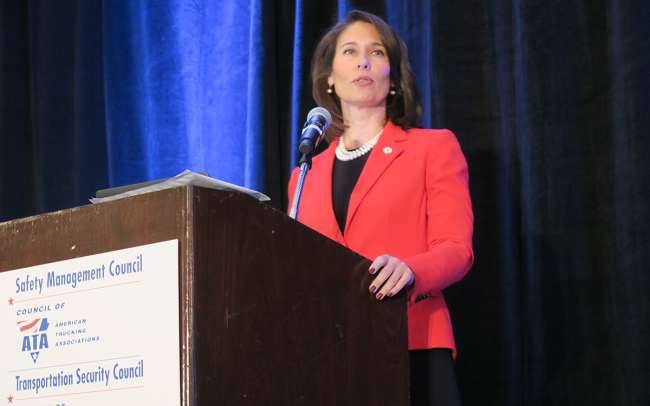Senior Reporter
Miles Traveled Don't Give Complete Picture of Highway Fatalities, Deborah Hersman Says

MEMPHIS, Tenn. —An improving economy and higher number of vehicle miles traveled “don’t tell the whole story” for continuing increases in the number of fatalities on U.S. highways, National Safety Council CEO Deborah Hersman told executives attending a safety meeting here.
In an emotional and personal, and at times frank appeal, Hersman, former chairman of the National Transportation Safety Board, said the industry should more closely examine the “human, machine and environmental” factors involved in commercial vehicle crashes.
“I’m sure each of you have perspectives on why we don’t see a direct correlation on this,” Hersman said. “Yes, when VMT goes down we often see fatalities going down.”
However, the past two years the fatality rate has increased more than the vehicle miles traveled has increased, she said.
Hersman spoke at the Nov. 14 opening session of a national safety and security conference sponsored by American Trucking Associations’ Safety Management Council and Transportation Security Council.
Hersman used a 2015 crash in Chattanooga that killed six people to illustrate her concerns.
“At the time of the crash, the truck driver was traveling at about 80 miles an hour, which was 25 miles over the limit,” she said. It was the second crash the driver was involved in only a few days, Hersman said, and came only five weeks after he took a drug test that showed he had amphetamines in his system, and on the day of the crash had spent 14 hours on the job.
She challenged trucking executives to make sure their drivers were getting enough sleep, and those with fatigue symptoms to get tested and treated for sleep apnea, a major contributor to fatigue and poor highway performance among car and truck drivers.
“You all certainly know that your workforce with a sedentary lifestyle is particularly susceptible to sleep disorders like sleep apnea,” Hersman said. “Ten percent of the general population has sleep apnea, and it’s much higher when you look at certain cohorts like truckers.”
In a reference to a Department of Transporation’s recent decision to recall plans for a proposed sleep apnea rulemaking, Hersman said, “I would say pulling back the regulation is not going to help us get to a more mature platform when it comes to having consistency to test these important types of issues,” she said. “The reality is, if you have sleep disorders and not effectively addressing and treating them results in risk.”
Yesterday, @USDOT "published a final rule that, among other items, expands the Department’s current drug testing panel to include certain semi-synthetic opioids (i.e., hydrocodone, oxycodone, hydromorphone, oxymorphone)." https://t.co/CCwXkKKeEm — NSC (@NSCsafety) November 14, 2017
Hersman also expressed the need for trucking companies to keep close watch on the dangers of opioid drugs, the so-called “Cadillac of pain treatment,” which are increasingly being prescribed for pain and have turned into a national crisis.
“My message to you all is to make sure you and your employees don’t start using them in the first place,” Hersman said.
She also encouraged the use of safety technologies such as automated braking, blind spot and lane departure warnings. Those three systems alone could save up to 10,000 lives annually, she said.
Although there are obvious differences, she noted that the airline industry has had zero crash fatalities some years, while the trucking industry seems to tolerate an average 20% out-of-service rate during roadside inspections.
“If we had a 20% out-of-service rate for out-of-service aircraft, how many of you would want to fly if one out of five airplanes had a defect that was so significant they had to be repaired?” Hersman asked.
While she was with NTSB, Hersman said there was a constant in those who came to the scene of a fatal crash: They wanted more time with their departed loved ones.
She added, “I know you guys have a lot of balls in the air. I know you are really busy. You’re leaders in your organization, and there are a lot of things going on in your life. But I will tell you when you have all of those balls in the air, some are more important than the others.”

